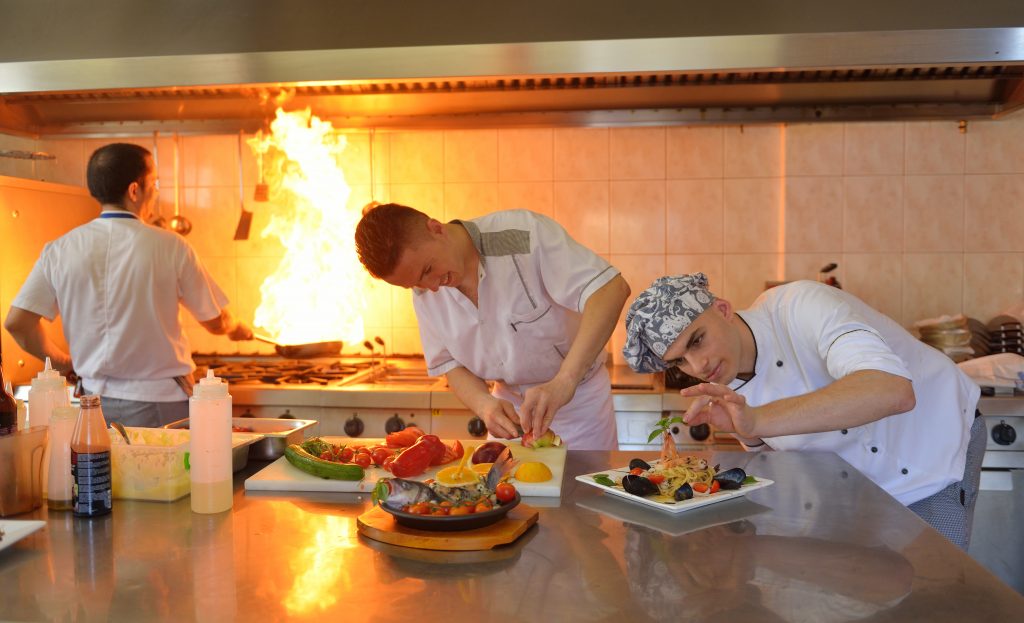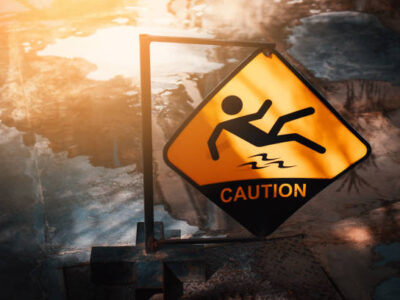Working in the food service industry is notoriously hard. You must deal with rude and entitled individuals, remain on your feet for extended periods, and frequently work irregular schedules with long hours.
As if it weren’t difficult enough already, food service workers are also frequently vulnerable to serious injuries simply due to the nature of their job. These are a few of the most common injuries that food service workers get on the job, along with how the law protects you if you are injured.
Cuts and Lacerations
Working in food service typically involves using knives and other sharp utensils to prepare food. Improper use of this dangerous equipment, inadequate personal protective equipment (PPE), or a combination of both can lead to serious cuts, lacerations, or even the loss of a finger. Dishwashers and prep cooks are especially vulnerable due to constant handling of knives, slicers, and broken glassware.
Cuts may range from minor wounds requiring stitches to severe injuries that cause nerve or tendon damage. In some cases, workers are left unable to use their hands effectively, impacting their long-term earning potential. Employers are legally required to provide proper training and cut-resistant gloves when necessary. If these measures are not in place and you are injured, workers’ compensation can cover your emergency medical care, surgical procedures, follow-up visits, and wages lost during recovery.
Burns and Scalds
Most food establishments rely on ovens, stoves, grills, and fryers to prepare meals. Critical burns can happen in the blink of an eye if you aren’t careful or if you don’t have the proper PPE. Common examples include grease burns, contact burns from hot pans, or steam-related scalds.
Burn injuries are among the most serious workplace injuries because they often require hospitalization, skin grafts, and long recovery times. Even less severe scalds can lead to infections if untreated. OSHA requires that food service employers provide burn-resistant gear when appropriate, along with proper training in the safe handling of fryers, ovens, and other high-heat equipment. Workers’ compensation benefits may include coverage for hospital stays, physical therapy, and compensation for permanent scarring or disfigurement.
Slip-and-Fall Accidents
The floors in the back of food establishments are usually slippery for one reason or another. There could be water near dish areas, oil spills by fryers, or a general slick build-up of grease tracked around by workers. If you aren’t wearing slip-resistant shoes, you could easily take a tumble and suffer injuries such as sprains, fractures, or concussions.
Slip-and-fall injuries are one of the leading causes of workers’ compensation claims in the food service industry. Beyond broken bones, these accidents may also result in traumatic brain injuries or long-term mobility issues. Employers are responsible for maintaining safe walking surfaces, providing appropriate footwear policies, and promptly cleaning spills. Workers’ compensation may cover your hospital visits, orthopedic care, rehabilitation, and any wages lost while you recover.
Back and Musculoskeletal Injuries
Food service workers may sustain back injuries while performing their duties. You may occasionally have to do heavy lifting of boxes, kegs, or equipment, which, if done improperly, can cause serious musculoskeletal injuries such as herniated discs, strains, and chronic back pain.
When lifting something heavy, be sure to squat so you can use your knees to do most of the work rather than your back. Also, know your limits. If something is too heavy to lift by yourself, ask a coworker for help. Employers are responsible for providing training in safe lifting techniques and ensuring that team members have the necessary support.
In addition to acute back injuries, repetitive strain injuries are also common in food service. Constant bending, reaching, or standing for long shifts can lead to conditions such as tendonitis, carpal tunnel syndrome, or joint pain. Workers’ compensation covers both sudden injuries and long-term conditions caused by repetitive stress.
Stress-Related and Secondary Injuries
Food service workers not only face physical hazards but also psychological and stress-related conditions. Long hours, irregular schedules, and demanding customer interactions can contribute to anxiety, depression, and fatigue. These issues may be compounded if a worker has already sustained a physical injury and struggles to return to the same level of productivity.
While stress-related claims are more complex, workers’ compensation may still apply if the stress is directly linked to workplace conditions. An attorney can evaluate whether your case qualifies under state law.
Legal Responsibilities and Workers’ Compensation
Staying safe at work is a combination of common sense, being aware, and using proper PPE. According to state law, it is your employer’s responsibility to provide the necessary protective equipment and a safe workplace.
If you were injured on the job, you may be entitled to workers’ compensation regardless of fault. Workers’ comp benefits typically cover:
- Medical care and rehabilitation
- Temporary or permanent disability payments
- Lost wages during recovery
- Vocational retraining if you cannot return to your previous role
It is essential to act promptly, as every state has strict deadlines for filing claims. In California, for example, you must notify your employer within 30 days of the injury and file a workers’ compensation claim within one year. Failing to meet these deadlines could jeopardize your right to benefits.
If your claim is denied, you have the right to appeal. The appeals process often requires hearings before the Workers’ Compensation Appeals Board (WCAB), and having legal representation can significantly impact whether benefits are approved.
Frequently Asked Questions
What should I do if I cut or burn myself at work in a restaurant?
Seek medical attention immediately, report the injury to your supervisor, and document the incident. Then, file a workers’ compensation claim to secure benefits.
Are slip-and-fall accidents in kitchens covered under workers’ compensation?
Yes. Even if the accident was due to a wet floor or spilled oil, workers’ compensation is designed to cover injuries regardless of fault.
Can part-time or seasonal food service employees get workers’ compensation?
Yes. Most states require employers to provide workers’ comp coverage to part-time, seasonal, and full-time workers.
What if my employer doesn’t provide PPE or safety training?
Employers are legally obligated to provide PPE and maintain safe conditions. If they fail to do so and you are injured, you still have the right to file a claim.
Do I need an attorney to file a workers’ comp claim?
While you can file a claim on your own, an attorney can help ensure your paperwork is correct, represent you in disputes, and maximize your benefits.
What happens if my workers’ compensation claim is denied?
You can appeal a denial through your state’s workers’ compensation board. An experienced attorney can guide you through hearings, negotiations, and appeals to fight for the benefits you deserve.
How much compensation can I receive for a food service injury?
The value of a claim depends on the severity of your injury, medical costs, lost wages, and whether the injury caused permanent disability. An attorney can evaluate your specific case to estimate a settlement range.
At Hussain & Gutierrez, we understand the challenges food service workers face and the devastating impact an injury can have on your health, income, and career. Our team is dedicated to helping injured restaurant and hospitality workers secure the full benefits to which they are entitled under workers’ compensation law.
We assist with filing claims, appealing denials, and negotiating fair settlements. Whether you’ve suffered a burn, a slip-and-fall injury, a repetitive strain injury, or a stress-related condition, we can help you navigate the process.
If you or a loved one has been injured in the food service industry, don’t wait. Contact Hussain & Gutierrez today for a consultation and let us fight for your rights.



